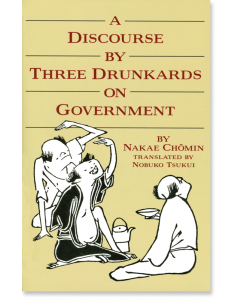Nakae Chomin
Nakae Chomin was one of Japan's seminal thinkers during the Meiji era (1868–1912), a time when the nation was attempting to leapfrog from feudalism into the modern world. The son of a low-ranking samurai family, Chomin (a pen name meaning "the masses") began his studies with the Chinese and Buddhist classics, later traveling to France where he studied political philosophy. After returning home he won a seat in Japan's first parliament, although he quickly resigned for reasons of conscience. Chomin's critical writings continually drew the ire of the government; he was often censured and at one point was sent into exile in Osaka. He nevertheless continued to write prolifically, despite poverty and illness, until his death in 1901.
-
 A Discourse by Three Drunkards on Government$19.95- Paperback
A Discourse by Three Drunkards on Government$19.95- Paperback
